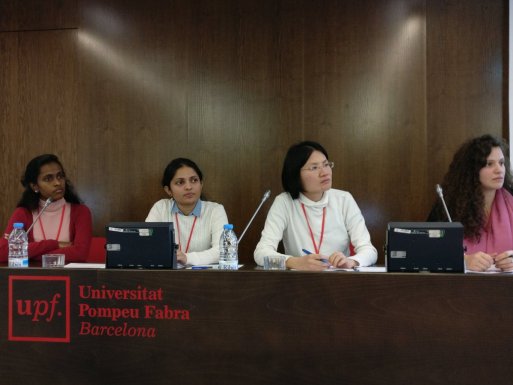The theme: educator experience
The 11th FutureLearn Academic Network (FLAN) meeting was held in Universitat Pompeu Fabra (UPF), Barcelona. UPF has been a FutureLearn partner since 2015, and as for January 2017 it contributes to the platform portfolio with five MOOCs. Drs. Manel Jiménez (director of the Center for Learning Innovation & Knowledge) and Davinia Hernández-Leo (head of the Interactive Technologies group) hosted a one-day event in which the main theme was social learning and the educator experience. The hashtag was #BarcelonaFLAN.

The event registered high attendance, with representation from several FL partners, especially Southampton (seven of us!), the OU, and the British council.
The University of Edinburgh’s strategy
The University of Edinburgh’s (UE) VC Prof. Tim O’Shea delivered the first presentation, with a description of UE’s MOOC strategy. Tim explained how MOOCs fit within their so-called “educational portfolio with technology” vision and evolution. In the two images below, such evolution is visualised, showing how open education and use of technology will expand, with MOOCs having a central role from around 15 in 2013 to a target of 100 in 2025:

This evolution was explained with ecological metaphors, whereby MOOCs can survive by become relevant bigger educational products such as Honours or Masters degrees through aggregation, e.g. a Masters degree would equate to 25 MOOCs.
Nic and Lisa: embedding MOOCs in campus modules
A presentation from Southampton followed. Nic Fair and Lisa Harris shared their experience on integrating MOOCs in an on-campus module. They provided compelling suggestions on how to add value to the modules through the inclusion of the on-campus students in the MOOC learning communities, as an effective way of enhancing their personal learning networks.

Rebecca Ferguson: a report on FutureLearn partners research
Rebecca Fergusson (OU) presented after that. She shared a report of the research carried out by FutureLearn partners around MOOCs. The report highlights eight priority areas:
- Develop a strategic approach to learning at scale.
- Develop appropriate pedagogy for learning at scale.
- Identify and share effective learning designs.
- Support discussion more effectively.
- Clarify learner expectations.
- Develop educator teams.
- Widen access.
- Develop new approaches to assessment and accreditation
A research question was generated from each of these eight priority areas. Southampton can make a significant contribution in all these areas, but there are three that can be highlighted as being areas in which Southampton can make a significant and genuine contribution:
- FutureLearn supports conversational learning. How can this best be implemented?
- What are the best ways of teaching at scale and of training MOOC educators?
- How can we increase MOOC accessibility and widen access to learning at scale?
A highlight of this report is that the University of Southampton has been identified as the most prolific FL partner institution in terms of MOOC research, of course after the Open University.
PhD researchers: the FLAN essence
The ensemble contributions fromthe PhD students researching in FL partner universities are perhaps the most valuable asset of this academic network. In this occassion, researchers from the Open University and Universitat Pompeu fabra presented their research projects. They were all highly relevant and interesting, but I would like to highlight two of them: 1. Tina Papathoma’s work on how educators learn by being involved in MOOCs, and 2. Shi Min Chua’s contribution on the analysis of conversations in FL forums. A paper based on her research will be published in the proceedings of the FutureLearn Data workshop in the Learning Analytics and Knowledge conference in Vancouver, March 2017.

Other contributions and closing remarks
There were many other interesting contributions, such as the Skype session run by Mike Sharples with Ester Oliveras (UPF), Sarah Cornelius (University of Aberdeen), Sarah Speight (Nottingham), Pierre Binetruy (Paris Diderot). One of the discussions to be highlighted in that session, started by Sarah Corelius was around identified need for tools to capture and manage the most relevant comments in FutureLearn courses discussion boards so that mentors can provide optimal support to learners.
The session was not only academically very interesting, but also very fruitful: a potential collaboration with the UPF may arise from that visit, around the effects of MOOCs in universities.
We finally would like to thank Manel and Davinia for their hospitality. After the session, they offered us a tour around the facilitites of the UPF, which we gladly accepted. The only drawback was that we ended up being a bit jealous of their amazing resources for media production.





